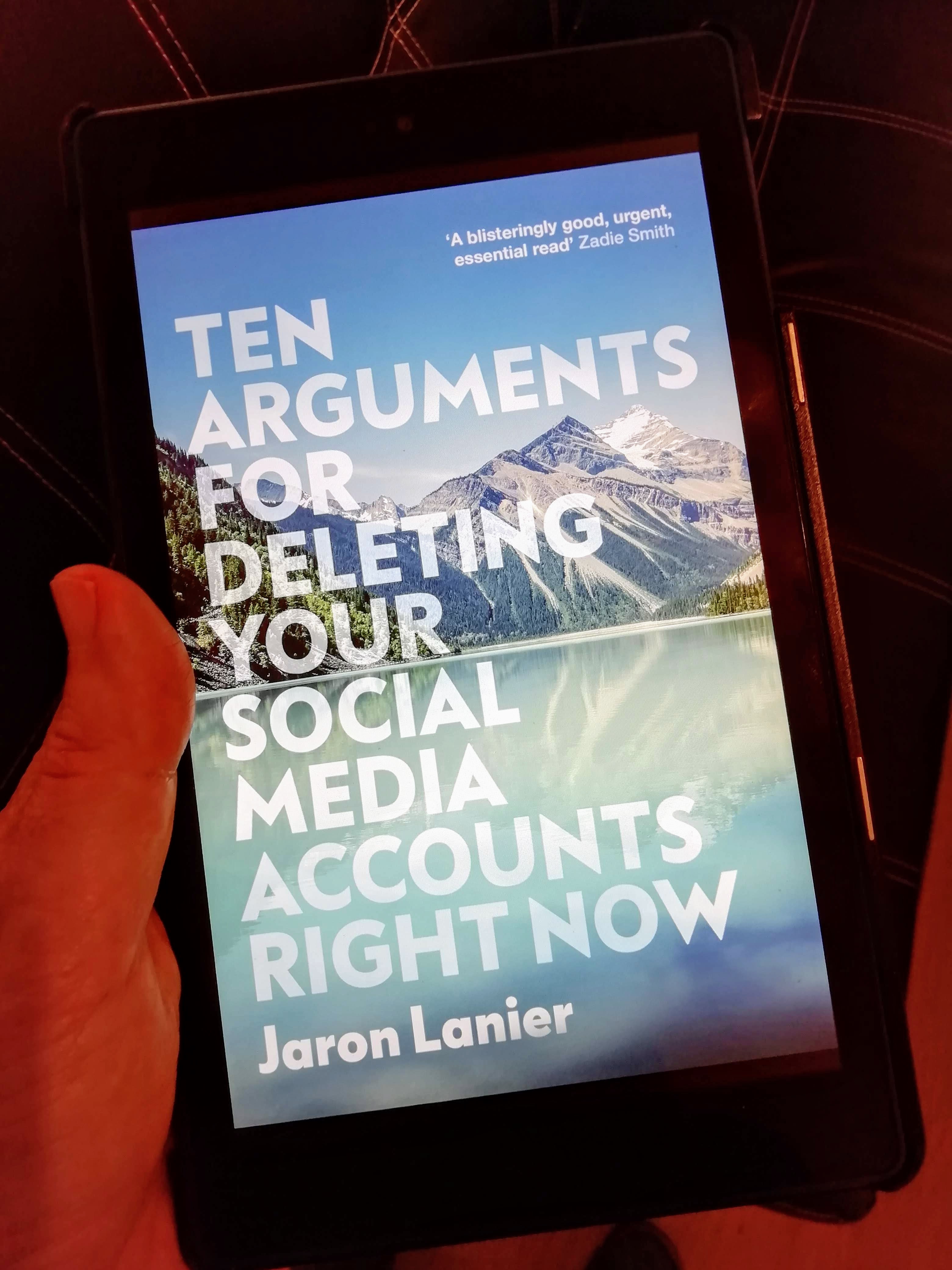Ten Arguments for Deleting Your Social Media Accounts Right Now - Book Review and Notes

"You’re probably becoming more of an asshole, but you’re also probably sadder... your ability to know the world, to know truth, has been degraded, while the world’s ability to know you has been corrupted. Politics has become unreal and terrifying, while economics has become unreal and unsustainable: two sides of the same coin.” - Jaron Lanier
Every time I dip a toe into the mainstream social media world, I come away feeling as if something is a little bit off. From quitting Facebook because I feel creepy or annoyed at what other people post, to looking at Instagram and amidst the nice, entertaining posts also seeing blatantly self-obsessed ones mixed with more and more adverts. Twitter doesn't fare much better. While I currently do still use it, when accessing it on the web, rather than heavily controlled through the excellent Tweetdeck, I very quickly see anger, posturing, virtue signalling and worse trending.
In an attempt to try and better understand why I feel this way, I read Jaron Lanier's "Ten Arguments for Deleting Your Social Media Accounts Right Now" book whilst taking another bit of off-tech time. It was a good read, which left me with a better understanding of how these platforms operate, why they may be bad for individuals and society and why quitting them could help encourage better alternatives.
As testament to a good book, I made a lot of notes.
The people who make these platforms know that they are damaging
These networks use every trick they can to give you a little dopamine hit when you engage with them. Dopamine is the hormone that makes you feel happy, excited, eager. It's the same hormone released when you fall in love or play a slot machine. And it's addictive. When you swipe down to refresh a page, you don't know what's coming next, it's uncertain. You get sent a new update by a friend, surprise! Dopamine is released. You want to do it again. All of this is built in. Facebook, Twitter, Instagram and Google platforms are designed to be addictive and distracting, to keep you clicking, diving down rabbit holes.
“Addiction is associated with anhedonia, the lessened ability to take pleasure from life apart from whatever one is addicted to, and social media addicts appear to be prone to long-term anhedonia.”
Ever wonder why many of the people who make these tools don’t let their kids use them? And why many of these techies send their kids to Waldorf schools which generally forbid electronics? The very same people who made these tools realise that they actually are damaging society.
These platforms are all about behaviour modification
People pay these companies in order to get you to change your behaviour. It might be just to buy a particular brand of soap, but then again it might be to get you to change your mind about how you vote. One seems innocuous, the other sinister. If the companies are trying to do this, why on earth would I want to support this?
They bring out the worst in people
Why do we become obsessed over how many people follow us, on how many likes we get for a post? According to the book it's because social media encourages you to be an asshole. To be all about me me me.
“One must be followed more than one follows, for appearances sake."
People comment to mostly seek attention for themselves. Again me me me. And the obsession with ourselves encourages conspiracy theories, stupid arguments and insecure rage.
They make people anxious
By making people anxious, their natural vigilance “fight or flight” responses become stronger, so they dare not disengage. They keep on doom scrolling.
“If ordinary people were to get all happy and satisfied, they might take a moment away from the obsession with social media numbers and go frolic in the flowers or even pay direct attention to each other. But if they’re all on edge about whether they’re popular enough, worried about whether the world is imploding, or furious at morons who are thrust into the middle of their connections with friends and families, then they dare not disengage. They are hooked because of provoked natural vigilance.”
There is a massive imbalance of power
Imagine writing me a letter, and having the post office decide whether to deliver it or not . Or perhaps you phone me and instead of having a private conversation, a third person sits between us, listening to what you said and then telling it to me. Waiting for my response and doing the same to you, relaying the conversation, or maybe choosing not to.
"There is an imbalance of power. One person controls Facebook. Why would you subordinate a big part of what you see of the world, how you experience it, to three companies Facebook, Twitter and Google?"
Facebook is a monopoly. You can’t leave because “everyone is on it and how will they find you?” There really isn’t a choice to move your data to a different account. There is an arrogant assumption that this is the ONLY way for digital services to work. i.e. free (no one pays anymore) ad driven and deliberately seeking your attention. So you, the user must be made subservient. As evidenced by how hard it is to quit them.
"The user, that’s me and you, cannot gain real power or wealth. The only reward is attention. So mind games are played, people react to others to get a reaction and we all become assholes."
Your data is valuable, but these platforms aren't honest about this value.
The business plan of these companies is to sneakily extract data from you and make money off it. Your data is valuable and you give it away. Lanier talks about the concept of “Data as Labour”, where sites encourage you to work at creating posts, links, likes and connections, all things that have value, but to do so for no fair reward. A great example of this being when you go to leave a review and then instead of being thanked, are asked lots more questions by sites like Trustpilot. They are sneakily getting you to do work, create valuable data and then give it to them for free. (Another reason why I don't leave Amazon reviews)
BUMMER
Lanier uses the term BUMMER to sum up in one line the business model of the big social media players. It stands for 'Behaviors of Users Modified and Made into Empires for Rent.'
“To review: Your understanding of others has been disrupted because you don’t know what they’ve experienced in their feeds, while the reverse is also true; the empathy others might offer you is challenged because you can’t know the context in which you’ll be understood. You’re probably becoming more of an asshole, but you’re also probably sadder; another pair of BUMMER disruptions that are mirror images. Your ability to know the world, to know truth, has been degraded, while the world’s ability to know you has been corrupted. Politics has become unreal and terrifying, while economics has become unreal and unsustainable: two sides of the same coin.”
The economic repercussions of these business models trickle down into other tech/app based businesses too, with small numbers of very rich owners benefiting from large numbers of people labouring for peanuts, take UBER for example.
“We’ve taken as a fact of nature that if you want the benefits of an app like Uber—using the latest tech to improve coordination between drivers and people who need rides—then you must accept that a few people will mostly own Uber and some of them will become obnoxious oligarchs, while drivers will have less security than old-fashioned cab drivers, and riders will be spied upon in humiliating ways. None of these downsides need to occur to get the benefits. The only reason for the linkage is that we’ve been conditioned by BUMMER. In some alternative universe—a universe we must build if we are to survive—there will be both the convenience of an app like Uber and a sustainable social and economic fabric in which a lot of people build security with dignity.”
Summary
Jaron Lanier talks about how ad driven social media companies are not good for you, me or society. This is because their business model depends upon secretly collecting all of your data (which has value) and then selling that data to entities that wish to modify your behaviour. These entities could simply be selling you a soap bar, but they could equally be trying to misinform you and get you to vote differently.
These platforms use algorithms to extract your attention. In order to do this they may try to make you angry or scared. It’s not personal, but simply based upon what is most effective in getting you to stay on the platform. The longer you can be kept on the platform, the more chance they have to sell your attention to the highest bidder.
These platforms also decide WHAT you see. Your feed is not chronological. So someone else is choosing to decide whether the post your friend makes actually gets to you or not. This is creepy.
This model is not good for society. It polarises and makes us all more angry and less empathic. These companies have no reason to change as they make billions. The only way to change their behaviour is if we leave them, until they build sometime better, more ethical.
Lanier says he only wants to use services that he pays for. That way he owns his valuable data and can choose who to give or sell it too.
We can be manipulated. We can be made anxious and we can be made to be assholes. If we don’t want this to happen, we can choose to not support these practices and leave.
Solutions
If you want to make things better and encourage better models, you don’t have to attack them, just free yourself. Opt out. This will redirect these platforms to find a better way.
"You don’t need to give up friends: Email your friends instead of using social media, but use accounts that aren’t read by the provider—so no Gmail, for instance. No need for a sneaky company between you and your friends."
"Read news websites directly (instead of getting news through personalised feeds), especially sites that hire investigative reporters. Get a feel for the editorial voice of each site, which is only available when you go direct. Subscribe to great news sites! Read three a day and you’ll be better informed than social media users, and in less time. Consider using browser extensions that block the comments."
"You can even still watch YouTube videos, for now at least, without a Google account. Watching without an account and with some privacy plugins will give you access to a much less manipulative experience."
Conclusion
Like Cal Newport, Lanier recommends detaching from the behaviour-modification empires for, say, six months. Then after this experiment you’ll know yourself better and be more able to make a rational choice on how or where to return.
Lanier is not criticising the technology of social media applications, but rather the use of this technology to manipulate people. Facebook and Twitter can bring people together, but that’s not what they really want. And I would add that there are open source or paid alternative social media applications which allow this connection without data driven ad revenue encouraging a manipulative business model.
"I don’t want to be the type of person I dislike seeing others be on social media."
Of all the ten arguments in the book, this was the one that really got to me. I don’t want to be an asshole and yet I know there are times when my behaviour has been manipulated this way by my use of these platforms. I'm embarrassed at this, and maybe you are too. If so, that's a good enough reason to read this book and consider deleting at least some of your accounts.
If you enjoyed this review or found it useful, please share this post or support this blog by buying via my Amazon or Bookshop.org links here, which pay a small commission. Thanks.



